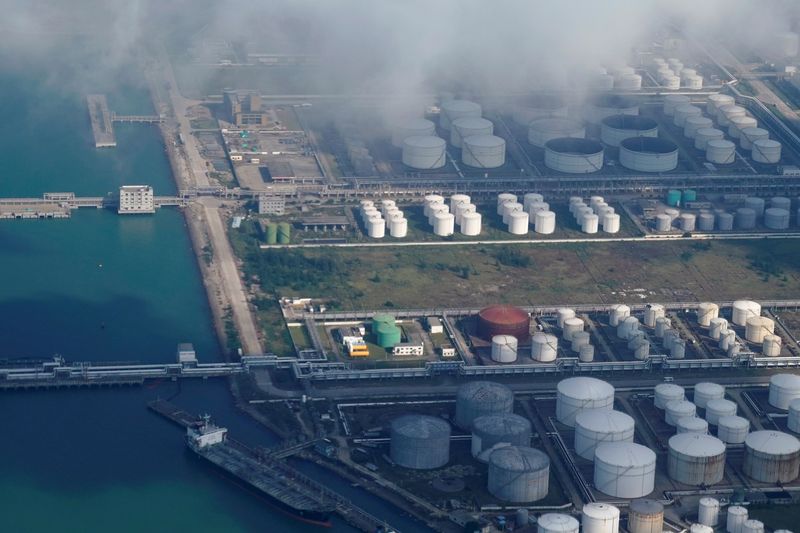By Chen Aizhu and Dmitry Zhdannikov
LONDON (Reuters) -China has ramped up purchases into its oil reserves this year even as oil prices soared, despite calls from Washington for a global coordinated stocks release to help cool the market, industry data showed and traders said.
Washington has sought cooperation from China to bolster the impact of a coordinated release of strategic oil stocks from major consumers to dampen the surge in oil prices, which topped $100 a barrel this week for the first time since 2014 after Russia invaded Ukraine. [O/R]
On Thursday, President Joe Biden said the United States was working with other countries on a new release following on from one in November last year.
The United States had announced a release of 50 million barrels from its own stocks in November and said China, India, Japan, South Korea the UK would do the same. The move came as U.S. gasoline prices soared and inflation spiked.
India, Japan, South Korea and the UK said they would release some modest volumes into the market. China, the world's No.2 consumer and largest importer, never officially committed to the move and has been buying more for its reserves instead.
Two oil trading sources said Beijing ramped up purchases immediately after Chinese President Xi Jinping met Russian leader Vladimir Putin in early February in Beijing.
China's National Food and Strategic Reserves Administration did not respond to a request for comment.
A spokesperson for China Petroleum (NYSE:SNP) and Chemical Corp, known as Sinopec (NYSE:SHI), said the company’s January crude oil imports were steady from a year-earlier and the company is still compiling February data. He did not elaborate further.
The U.S. government declined to comment when asked about the reasons why China had not participated in the release of oil from storage.
BUYING SPREE
"We received fresh requests (from Chinese buyers) to bring more oil into China right from the start of February," a senior source with a major oil trading desk said.
Another source with a major trading company said he and his rivals brought several cargoes of crude into China from the United States during February.
Trading sources said they did not know if China knew about the upcoming invasion of Ukraine, they said it was clear it decided to increase its oil stocks even as prices soared.
China's total oil stocks rival in size U.S. strategic stockpiles.
One Chinese oil trading executive said earlier this month his company was told to work on a plan for a release of oil from storage but then no final orders from the government followed.
Two other China-based trading executives said an unusual buying spree by Unipec, the trading arm of Sinopec, over the past few weeks was partly to boost stocks.
"Crude oil inventories in China are up roughly 30 million barrels since mid-November, with 10 million barrels in refineries and 20 million in commercial terminals," said Augustin Prate from data analytics consultancy Kayrros.
Kayrros puts total crude oil inventories in China, derived from satellite monitoring of tanks, at 950 million barrels.
A U.S. source with knowledge of the latest talks between the United States and the International Energy Agency said the United States was working with the IEA, the energy watchdog for developed countries, on releasing further reserves. China is not a full IEA member.

"We are prepared to take global action when it's needed," a U.S. government official said, asking not to be named.
"This is a different scenario than the one we had in November as we are now in a serious crisis in Ukraine."